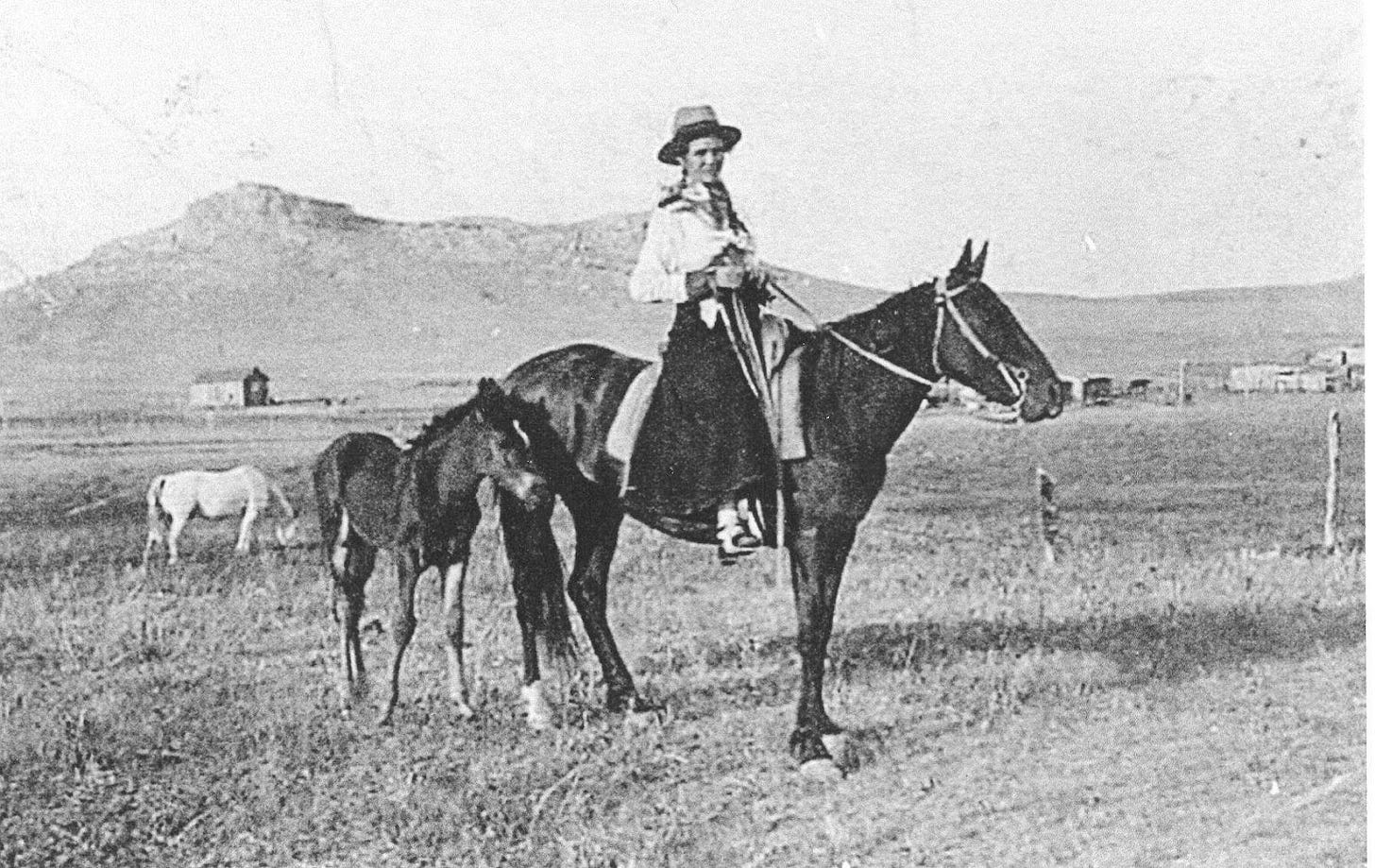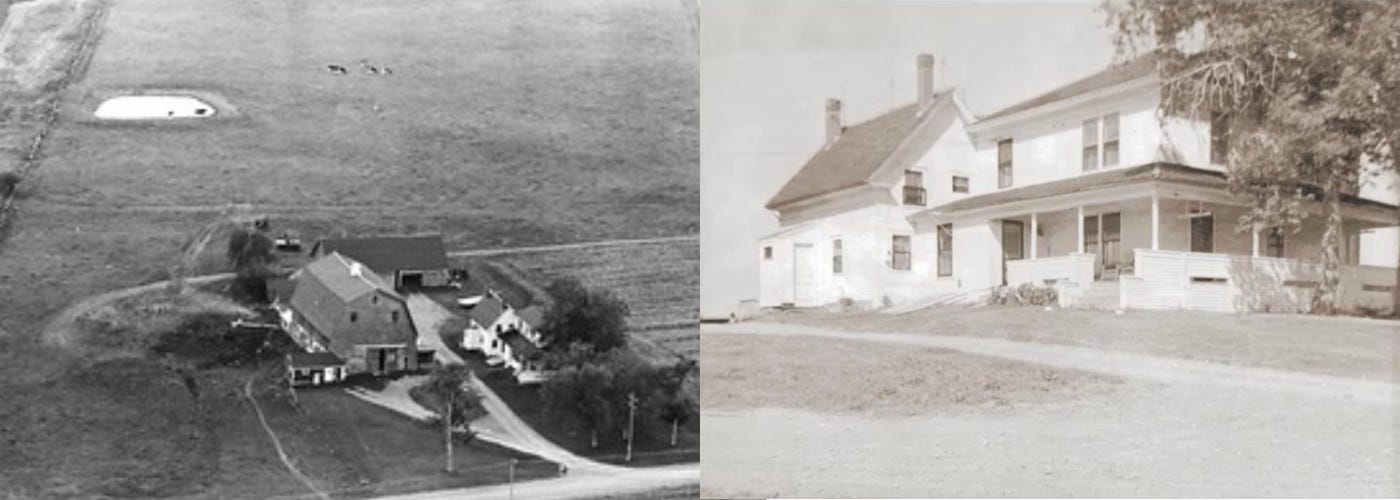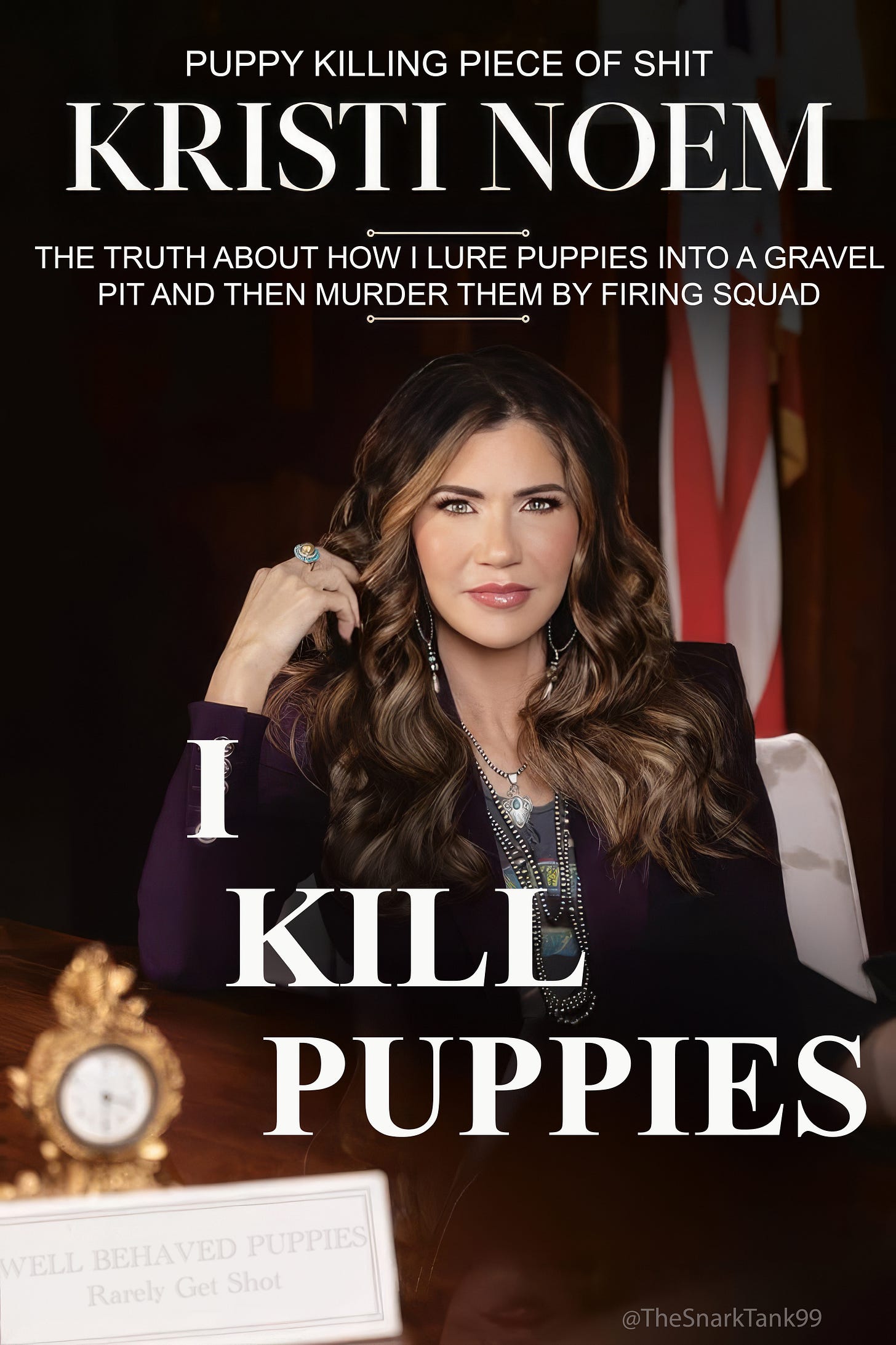No, Kristi Noem, Farm Life Does Not = Shooting Puppies
A look at how farmers and ranchers actually treat their animals.

I come from farming families on both my maternal and paternal sides.
My Father spent time on his maternal Grandparents’ South Dakota farm as a child and his paternal Grandmother grew up on a ranch in a town that would eventually bear her Mother’s name—Ekalaka, Montana.
My Mother grew up on a dairy farm in northern Maine. In my generation, three of my maternal cousins embraced farm life.
Republicans and conservative pundits love to place farm families on a pedestal as the epitome of American culture and identity. More than one has referred to them as the “real Americans” when trying to counter criticism from primarily urban and suburban voices.
Of course, the GOP's ideal Americans aren't Indigenous farmers like those in my family—oh, the irony. Or Black farmers. Or Asian farmers.
Or Hispanic farmers—which is an entirely new level of obliviousness as there's no agricultural industry in the United States without the Hispanic community as farmers and farm workers.
But as important as farmers and ranchers are for food security, are they a significant voting block?
According to the USDA, ranch and farm families make up only 2% of the U.S. population. Farming accounts for about 1% of the U.S. gross domestic product.
And maybe that's why Republicans can claim to speak for and to be protecting “real Americans” like farmers and ranchers when they do reprehensible things or push exclusionary, discriminatory legislation and not get much visible pushback.
The stereotype of the American farmer is a White, Christian, heteronormative family and that's the ideal “real American” the GOP is embracing and exploiting. Even though the reality is quite different.
Which brings us to…
Animal Cruelty Advocate Kristi Noem
South Dakota Republican Governor Kristi Noem has been on the short-list for Donald Trump’s 2024 running mate since she made a name for herself as bona fide MAGA by ignoring pandemic protocols, whining about the National Park Service not approving fireworks displays during a drought, and harassing Indigenous tribal nations.
In anticipation of getting the call, there was a little matter of the death of a dog named Cricket to spin. So Noem's ghostwriter penned a boastful account of the long-rumored shooting of a puppy and a goat by Noem in a gravel pit.
Or at least that's one theory for why anyone would disclose—let alone brag—about such an act. Noem's motive for shooting a 14-month-old German Wirehaired Pointer puppy named Cricket is something many are still questioning.
But not only did Noem write it and put it in the final published version of the book, she went on a media blitz to spin her narrative for all the animal killing only to be shocked to discover no one—including conservative-friendly networks—loves a puppy killer.
So Noem turned to that GOP favorite excuse: Farmers! Ranchers! They shoot puppies all the time!
On social media and in interview after interview, Noem played the same tune, claiming it's a farm thing that others wouldn't understand.
She also changed her own book’s narrative.
The book talked about Cricket as a bird dog Noem hated because it was poorly trained and had killed a neighbor's chickens after Noem failed to leash or contain her dog on another farmer’s property.
In Noem's new version, 14-month-old Cricket was a vicious dog with a history of attacking people and livestock.
Her new version of the story even got a fact check on X.
Noem claimed shooting Cricket was legal because the puppy killed chickens. South Dakota law excludes chickens in their definition of livestock for the law allowing farmers and ranchers to shoot dogs on their property.
In an on-air sparring match with Fox Business host Stuart Varney, Noem insisted she had full support for shooting healthy animals that annoyed her in the country's heartland.
Varney told Noem:
"We’ve been consumed with emails saying I won’t vote for this person. I won’t vote for Trump if he puts her in the vice presidential spot."
Noem responded:
"Well, I’ll tell you, Stuart, I’m sorry you’re not hearing from real Americans that live on farms and ranches.”
According to Noem, only 2% of Americans are “real Americans.”
Are You Hearing From Real Americans, Kristi?
Death is a part of family farm and ranch life, but so is conservation and sustainability.
Unlike corporate farms, small family farms and ranches can't afford to destroy the land they live on or abuse the animals they raise—not in the long term.
My Father spent his summers with his Grandparents. His paternal Grandmother lived on Standing Rock Reservation with her 3rd husband, tribal judge Charlie Roan Bear.
His maternal Grandparents—Edward and Helena Larvie Gerry—owned a farm between Pine Ridge and The Rosebud reservations in South Dakota.
Great-Grandma Helen Gerry died before I was born, but I remember going to the Gerry farm to visit Great-Grandpa Edward. My older sister and I got to collect eggs from the chicken coop.
He died in 1973.
When my Mother was 3 years-old, she moved from Canada to the United States to live with and eventually be adopted by her maternal Aunt Amelia's family—husband Linwood Cowett and six sons—after her birth Mother died.
Mum's adopted parents owned a small dairy on a secluded dirt road, but when that farm was struck by lightning and burned, they moved to a larger farm.
Most of Mum's childhood was spent on that larger farm.
In addition to running the dairy, the larger farm allowed them to grow feed crops and potatoes—the primary crop in northern Maine at that time.
For people unfamiliar with dairy farm operations, the herd is made up of milk cows, heifers which are cows that haven't had a calf yet, 1-3 breeding bulls and maybe 1-2 bull calves. My Grandparents had mostly Holsteins with one Jersey or Guernsey to increase the cream content of the milk.
Cows’ udders work like most other mammals’ mammaries do—milk is a byproduct of pregnancy. A cows’ lactation cycle is the period between one calving and the next split into four phases: the early, mid and late lactation (each of about 120 days) and the dry period (which lasts as long as 65 days).
Dairy farms exist to produce milk and calves drink that milk, so calves are removed from their mothers shortly after birth and hand raised, sold or eaten. On most dairy farms, cows calve every 12 months which means the herd would at least double every year. That's not a sustainable model.
Some cows have to be culled annually.
All bull calves are sold, eaten once large enough to make butchering them worth the effort or raised to adulthood for meat. Breeding bulls are always purchased or traded for from another farm to keep the bloodlines diverse.
Cows that can no longer produce milk or with low yields are eaten. Cow calves are kept as needed to maintain the herd.
My Grandparents ran a dairy farm from the 1930s until they sold the farm in 1969—the year I was born.
My Mother also had several pets growing up.
Mum and her Father had dogs. When she left for nursing school, her dog Gypsy remained on the farm with her parents.
Gram Amelia always had a cat in the house to keep her company while the barn had cats as well.
Mum's older brother Alfred once brought an orphaned raccoon home as a pet for his younger sister. She had the raccoon for a little over a year until it got into the big tank where milk was stored awaiting pick up.
An entire tank—hundreds of gallons of milk—was ruined.
The raccoon was taken out into the deep woods—northern Maine is mostly timber land—and…
Not shot.
The raccoon was released by my Mother near a stream and lake. He'd already demonstrated an ability to catch fish and frogs, so his continued survival was likely.
Death is part of farm life—but not blatant animal cruelty.
Yes, culled animals on the farm were often shot in the head, then butchered to harvest the meat, hides, hooves and bones.
Yes, pets might also be shot rather than taken to a vet. But only when they became so ill or infirmed that their pain was greater than the quality of their lives.
While that's my family’s philosophy and experience with farm animals, we weren’t the exception.
Farmers And Ranchers Have Responded To Noem
Kristi Noem—as the latest Republican darling—was given a huge platform. The people she insulted and maligned are only 2% of the population.
Mainstream media covers GOP claims about rural America, but rarely speaks to the people who actually live there in a respectful manner. Instead, rural people are the go-to for condescending coverage of the ignorance associated with conservative talking points.
But that doesn't mean no one pushed back against Noem's claims.
North Dakota farmer and rancher Jenny Schlecht—director of ag content for Agweek and editor of Agweek, Sugarbeet Grower and BeanGrower—wrote a rebuttal titled “Killing dogs isn't a 'farm thing’.”
Schlecht wrote:
“South Dakota Gov. Kristi Noem wrote about shooting a young hunting dog she professed to ‘hate’, and, if you haven't followed the controversy, the overwhelming public opinion has been against Noem, with people grossed out and questioning the humanity of someone who could kill a puppy in that manner.”
“I've spent my whole life in and around farms. And I've had good dogs and dogs that certainly could be considered less than helpful.”
The North Dakota farmer described their own failed working dog Cocoa.
She was chosen to help with their cattle but was no good at it due to inadequate training.
“Her training is only as good as what her humans gave her, so she's not to blame if I take her with me in a sorting pen and a cow takes after her—and me by extension.”
“We didn't shoot her for not being a perfect cow dog. We know why she isn't the best cow dog in the world; we are the problem.”
“So, Cocoa comes with us in the big spaces where she is helpful and gets locked up for the jobs at which she isn't good. She gets lots of love, because it's not her fault we were bad trainers.”
She added:
“It is not an indication of ‘toughness’ or a ‘farm thing’ to kill an animal that doesn't live up to your standards.”
“It's a sign of laziness to not take proactive measures to fix the problem, like rehoming the dog to a more appropriate place, getting the dog better training, or, in the case of a truly vicious animal, having it humanely euthanized.”
In an online farming forum, a member wrote:
“It is common to kill animals if you raise animals/have a farm. What's missing in Noem's case is there are a number of unusual things that make it seem more like an act of rage than a farmer's duty.”
“When I read Noem's account, what I found most disturbing was the language she used—’I hated that dog’. She wasn't methodically putting down a ‘can't be saved’ work animal. She had a bad experience with the dog that she already hated (and likely treated badly). This made her decide it needed to be killed.”
“She didn't talk to her family. She didn't take an hour to cool off. She didn't tell her kids she was shooting one of their dogs. She immediately dragged the dog into a gravel pit and killed it. A dog she didn't like... in the spur of the moment. How do we know she was acting impulsively? Because she tells us.”
“Killing the dog inspired her to further bloodlust. She wasn't content with killing one animal she hated. There was another one she wanted to get rid of. She wrote: ‘And after it was over, I realized another unpleasant job needed to be done’.”
“She then killed a second animal that she had negative feelings towards, a goat, in the same place and in the same way. We know she wasn't planning this properly, because she only brought one shot. When she missed the kill shot, she had to go back to her truck and get another round to finish the suffering animal off.”
Noem does have some support though.
Online it comes from almost exclusively White, male, MAGA supporters who don't live on farms or ranches.
I wonder if Noem is sorry they’re not hearing from “real Americans” that live on farms and ranches.
Noem Is Perfect For Trump—And Horrible For America
Noem's exposure as a self-serving, callous opportunist comes as no surprise to NDN Country. We've had her number since she took office in 2019.
Like Trump, Noem has shown nothing but contempt for the Indigenous tribal nations whose lands fall within the borders of her state. Nine reservations are fully or partially within South Dakota's borders.
As of this writing, eight have banned Noem from setting foot on their land.*
The bans started in February of 2024 with the Oglala Lakota of the Pine Ridge Reservation. Before PuppyGate, three more tribes had banned Noem.
Hoping to exploit Trump’s favored talking points to gain national attention, Noem targeted tribal governments during the pandemic. The tribes decided to follow CDC guidance while Noem demanded South Dakota would remain “open,” “free,” and unmasked.
South Dakota is not on an international border, yet Noem wanted to exploit the evil immigrant/cartel rhetoric her fellow Republican governors use. So she began claiming reservations in South Dakota are under the control of drug cartels from across the southern border.
Her latest lies earned her bans from over 90% of tribal lands and roughly 20% of the land within South Dakota's borders. Reservations are sovereign territory—Noem can and should be arrested, prosecuted and convicted if she ignores the bans.
Noem has been cited by tribes before for crashing tribal council meetings whenever cameras were there. The tribes were offended by Noem showing up uninvited and unannounced at a quarterly meeting about Pe'Sla—land sacred to the Oceti Sakowin—on March 29.
*on May 22, 2024, the Flandreau Santee Sioux Tribe voted to ban Noem
It's Not A Farm Thing—It's Animal Cruelty
Either Noem assumed the entire 2% of Americans that are farmers or ranchers have a single hive mind and would agree with her—which insults farmers’ and ranchers’ intelligence—or knew their rebuttals would never be heard.
But that didn't happen.
Noem is getting skewered online and in interviews.
The head of South Dakota's farming organization “uniting farmers, ranchers & rural communities” condemned Noem’s actions and her faulty reasoning.
South Dakota Farmers Union President Doug Sombke stated:
“This is not a common thing at all. I don’t know where she comes off thinking that’s the right thing to do. It’s just not.”
“It’s really an embarrassment. That’s not how South Dakotans are.”
It's impossible to know what Trump is looking for in a running mate, although many assume he'll want a woman very much like Noem.
But it looks like Noem’s impulsive decision to shoot her puppy may have also shot down her political aspirations.
If that’s true, there’s one silver lining that may emerge from this: Even in this political moment, there is still a line a politician can cross that will end their career.
Who knew?
However, we can't completely count Noem out yet.
Trump finally spoke directly on the controversy on a conservative podcast that aired Tuesday. He seemed to be much more forgiving than the majority of planet Earth.
Trump told hosts Clay Travis and Buck Sexton:
“I think [Noem’s] terrific. A couple of rough stories, there’s no question about it. And when explained—the dog story, people hear that and people from different parts of the country probably feel a bit differently, but that’s a tough story.”
“She had a bad week. We all have bad weeks.”
Given Trump’s affinity for dictators and despots, puppy killer might still be his cup of tea.
~~~~~~~~~~















